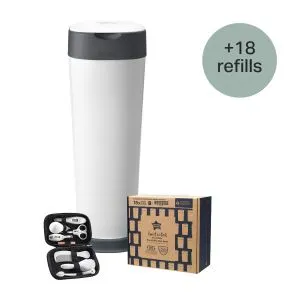
Ultimate XL Nappy Disposal Bundle with 18 Refills
Bundle & Save 40%
Subscription orders can be cancelled at anytime. Free delivery on all subsequent subscription orders. Find out more about subscriptions.
They’re easy and fuss free
Your products are automatically sent to you
You save up to 10% when you sign up for a subscription
You can cancel at any time
Causes of Baby Hiccups & Prevention

Newborn hiccups are very common, usually harmless and will disappear naturally after a few minutes. Babies first begin to hiccup in the womb – you may even feel them jerk during pregnancy – and hiccupping continues once they're born.
If you're worried that hiccupping is becoming uncomfortable for your little one or interfering with their breathing, there are some things you can do to help. Read on to learn more about what newborn hiccups are and how you can help soothe your baby if they have hiccups.
Just like in adults, baby hiccups are a natural reflex. They happen when their diaphragm (the dome-shaped muscle that relaxes and contracts at the bottom of their chest) involuntarily spasms or contracts. When this happens, air is sucked into their lungs faster than it is during a normal breath. Once this air reaches their vocal cords, they contract quickly and make the 'hiccup' sound that we're all familiar with.
Newborn hiccups can happen for a variety of reasons, such as swallowing air while feeding, overfeeding, trapped gas in the stomach, colic, or a fast flow of milk. They can also be triggered by a sudden change in temperature, excitement, or anxiety, or as a natural reflex of the diaphragm.
Occasionally, hiccups can be a symptom of infant acid reflux. If this is the case, they will usually present alongside other symptoms like arching of the back and crying while feeding, being irritable, spitting up their feed, and coughing. If you spot these symptoms, contact a medical professional for advice.
While hiccups can be frustrating for both a baby and their caregiver, they typically resolve on their own after a few minutes and don’t usually require medical attention. But, if you do want to help ease or prevent your little one's hiccups, you can give these tips and tricks a try…
Some babies can be difficult to wind, but it’s an important step that shouldn’t be skipped. Burping a baby frequently during and after feeds and avoiding overfeeding them can help to minimise the occurrence of hiccups.
Soft, gentle strokes can help relax a baby and can help to stop or reduce the spasms of hiccupping.
It can help to keep your baby upright or experiment by adjusting your breastfeeding hold or the position of their bottle when feeding them. You can also try to slow down the pace of your baby’s feeds and have a few more breaks to wind them during each feed.
Offering your baby smaller feeds more often can help them swallow less air and reduce the likelihood of hiccups.
Try to make sure your baby is chilled during a feed and that the environment around you is calm. It can also help to make sure they have a clean nappy on and feel comfortable before you feed them.
Some parents find that giving their little one a soother helps to relax their diaphragm, and therefore eases baby hiccups.
Explore the Range
Although hiccups are common in both adults and babies and are not usually cause for concern, remember to trust your parenting instincts.
You should reach out to your doctor or health visitor for reassurance if you're concerned about your baby's hiccups or worried about trapped gas and reflux, especially if your baby is:
There are a few things you can do to help get rid of your baby's hiccups, like burping them. This can help release any trapped air bubbles in their stomach. If the hiccups persist, try gently rocking your baby or giving them a warm bath to help calm them down. Remember, hiccups are common in newborns and usually nothing to worry about.
While some people believe that frightening someone can cure hiccups, there is no scientific evidence to support this, and you should never startle your baby to try and stop their hiccups.
Newborn babies sometimes swallow air while they're feeding and this can cause their diaphragm to contract, resulting in hiccups. It's nothing to worry about and usually goes away on its own. Just make sure you burp your baby after feeding to help release any trapped air and avoid feeding them too quickly.
Hiccups are common in babies and don’t necessarily mean that they're finished feeding. It's normal for babies to experience hiccups during or after feeding, and they usually go away on their own. However, if your baby seems uncomfortable or the hiccups persist for a long time, it may be a good idea to check with your doctor to rule out any underlying issues.
Stress or over-excitement can trigger hiccups, so as well as the other steps we covered earlier, keeping your little one relaxed and comfortable by having some calm playtime together, gently rocking him or her and making sure their nappy is clean before you put them to bed can help soothe their hiccups.
95% of parents say that the Tommee Tippee Advanced Anti-Colic bottle helped to ease the discomfort of colic, gas, and reflux*, but because anti-colic bottles are designed to reduce the amount of air a baby ingests while feeding, there is no evidence to suggest that they can reduce hiccups specifically.
*Based on an independent survey of 43 US moms of 0-12m, currently use TT AAC, Feb 2023